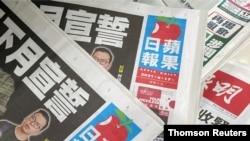Hong Kong’s media freedom faced another setback Thursday morning when over 500 police officers raided the city’s last pro-democracy newspaper for the second time in a year and made arrests under the national security law.
Five Apple Daily executives were arrested over alleged foreign collusion, including editor-in-chief Ryan Law, chief executive Cheung Kim-hung, chief operating officer Royston Chow, associate publisher Chan Pui-man and Apple Daily Digital platform director Cheung Chi-wai.
Company assets were also frozen, reportedly around $HK18m ($2.3 million). Next Digital Limited, the parent company of Apple Daily, suspended trading. Some journalists at the paper told VOA they worked from home.
Hong Kong’s national security unit says it has evidence that over 30 Apple Daily articles “played a crucial part” in calling for sanctions on Hong Kong and mainland China.
Next Media Union, which represents Apple Daily journalists, condemned the arrests.
“By merely suggesting some past news articles have breached [the national security law], they can treat editorial staff as criminals, journalistic work as crimes and [the] newsroom as a crime scene," the union statement said. "This is a blatant violation of freedom of press in the name of national security.”
But Eunice Yung, a barrister and pro-Beijing politician, disagreed, telling VOA those arrested were using Apple Daily’s platform as a “mouthpiece” to damage Hong Kong and China.
“It’s nothing about the freedom of press. For anyone, no matter [if it's] a person in charge of an organization or even the press, are ... under the umbrella of the national security law," she said. "There is no exemption for anyone in Hong Kong.”
Yung said there’s a difference between being critical of the law and breaking it.
“I think if you are asking foreign countries to sanction officials, this is another story,” Yung added.
Following anti-government protests in 2019, Beijing sought stability for Hong Kong, partially via a national security law that prohibits acts deemed as subversion, secession or foreign collusion.
Since its passage, the broadly worded law, which international rights groups have described as a tool for suppression, has been used to arrest and jail dozens of activists and outspoken critics, including Apple Daily founder Jimmy Lai.
At a press conference, Hong Kong Secretary for Security John Lee said those arrested were using journalism as a tool to endanger national security.
“The suspects have been arrested on strong evidence that they’re conspiring to endanger national security. The action is taken against criminals,” he said, warning the public and media to cut ties with the Apple Daily executives.
Mark Simon, a former Next Digital executive who is now the representative for its major shareholder, responded to Lee’s comments.
“No society is free when a man like that [Secretary Lee] is in power,” Simon told VOA, adding he was “in awe” of Apple Daily journalists who remained working while the police raid was taking place.
Hong Kong journalism lecturer Sharron Fast was cited in local reports as saying Lee’s comments were “ominous.”
Apple Daily founder Lai, 73, a pro-democracy advocate and media tycoon, is serving multiple jail sentences following his role in anti-government protests in 2019 and is awaiting trial in a separate case that carries a life sentence.
Last August, dozens of blue-shirted police officers raided the news publisher as Lai was arrested at his home under the national security law on charges of foreign collusion. Some reports have said the charges relate to Lai’s requests for sanctions against Hong Kong and China.
Footage of Thursday's raid showed dozens of officers at the Next Digital office in the Tseung Kwan O district seizing journalists’ materials. The Hong Kong government said a warrant was issued allowing this to happen.
Former Democratic Party leader Emily Lau said it’s a blow to press freedom if media outlets can be raided this way, exposing journalists' sources in the process.
"If it can happen to Apple Daily, it can happen to other news organizations," Lau, a former journalist, told VOA. "This is a very, very worrying thing and is a big blow to press freedom and freedom of expression.”
Authorities added that some published reports dated to 2019, before the security law came into effect. Chinese officials previously said the law wasn’t to be applied retroactively.
“Up to now, it’s very unclear” whether past acts would be taken into account, Lau said. But Holden Chow, a pro-Beijing lawmaker, told VOA that previous acts could be cited in court as “evidence,” and that this practice could apply to other ordinary criminal offenses.
Apple Daily was defiant Thursday, vowing in a letter to readers published on its website that it was “standing firm.”
“In an era where the regime can draw arbitrary red lines, the staff of Apple Daily will remain in their positions and report the truth for Hong Kong people in a legal, reasonable and fair manner,” the letter read.
The paper also announced it was printing 500,000 copies of Friday’s edition.
One senior Apple Daily journalist identified only as “Lee” to protect his identity told VOA earlier this month that there was a feeling of inevitability that the publisher would eventually be forced to close. He said Law, the now-detained editor-in-chief, had told the staff to keep working if this kind of situation arose.
Speaking Thursday, Lee said one of his bosses informed their team to work from home and to log out of all email accounts.
Describing the atmosphere among employees, Lee said the raid made him feel “angry” but didn’t deter their day.
“Perhaps [when] all of us had experienced the last raid in August last year, we somewhat got used to arbitrary actions taken by the Hong Kong police and [we] work as usual now,” he told VOA.














